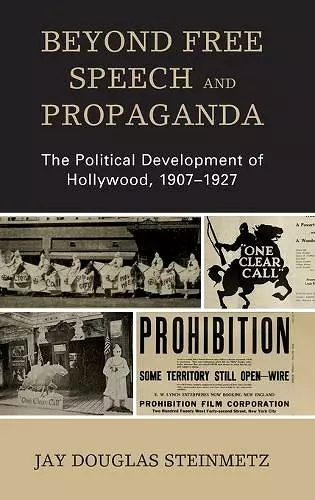Beyond Free Speech and Propaganda
The Political Development of Hollywood, 1907–1927
Format:Hardback
Publisher:Lexington Books
Published:24th Nov '17
Currently unavailable, and unfortunately no date known when it will be back

This book explores the political development of Hollywood from 1907 to 1927, detailing how films shaped American culture and consumerism. Beyond Free Speech and Propaganda offers a critical historical perspective.
This comprehensive examination delves into the political evolution of the American film industry during its formative years, particularly from 1907 to 1927. Beyond Free Speech and Propaganda by Jay Douglas Steinmetz uniquely highlights how films influenced political culture and consumer capitalism throughout the twentieth century. The book illustrates the intricate relationship between cinema and societal values, showcasing how the early film industry grappled with issues of censorship and the social power of visual storytelling.
In the early 1900s, the American film industry championed the ideals of film free speech and the persuasive nature of cinema as essential components of a democratic society. However, as the industry faced challenges from competing cultural forces, such as the liquor industry, filmmakers often used propaganda to critique the immorality associated with alcohol consumption. The struggle between these two cultural entities reveals the complexities of how cinema was utilized as a tool for social commentary and influence.
As the 1920s approached, major producers in Southern California began to shift their focus away from the ideals of free speech and propaganda, opting instead for a more controlled approach to filmmaking. This transition, influenced by significant political events and the rise of organizations like the Ku Klux Klan, marked a pivotal moment in Hollywood's history. Beyond Free Speech and Propaganda offers valuable insights for those interested in the intersections of film, politics, and social movements during a transformative period in American history.
Hollywood, the world over, means commercial, entertaining, nonpolitical movies, distributed by big studios to theaters where you can’t get a beer. Steinmetz shows how Prohibitionists, progressives, stalwart Republicans, the KKK, and the NAACP mixed it up with the Jewish moguls and their gentile talents and political operatives to create this central site of American exceptionalism in politics and culture. Two thumbs up! -- Michael S. Kochin, Tel Aviv University
Much more than just a history of motion pictures, this extraordinarily well-written and persuasively argued book represents a significant contribution to our understanding of the American cinema’s cultural context and its socio-political interactions during the silent era. Of particular note is the completely new material on prohibition and cinema as well as the political involvement of the studios and their MPPDA representative, Will H. Hays, in matters ranging from censorship to the KKK (Ku Klux Klan). Steinmetz’s original thesis regarding Hollywood’s de-politicization is profound and far reaching. Previous scholarship has been unable to account for Hollywood’s de-politicized stance in such a way that links together institutional, industrial, textual, and socio-cultural history, but Steinmetz’s research locates the thread that binds everything together. The reader is left with an understanding of the precise way in which the Hollywood studios achieved this goal and the economic context and motives that drove their actions. This highly engaging and timely work will be of interest to a broad audience, including academics and a popular readership interested in the social, political, and cultural forces that the American film industry confronted during the volatile silent era. -- Kia Afra, Chapman University
ISBN: 9781498556804
Dimensions: 236mm x 160mm x 22mm
Weight: 499g
216 pages